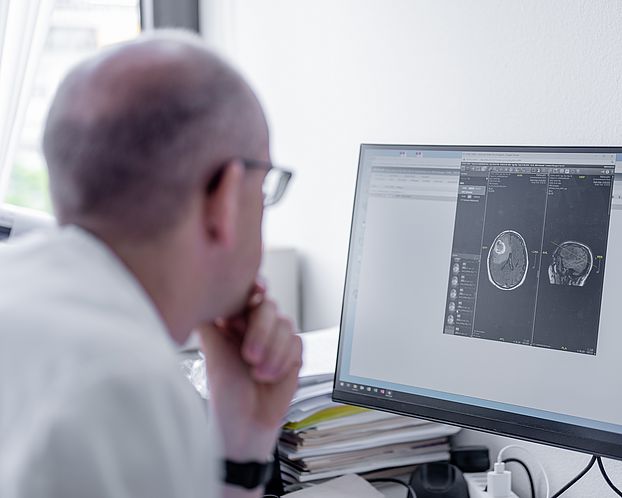/ News, Research
Promising Therapeutic Strategy Against Glioblastoma (Hutter Lab)

Glioblastoma (GBM) is a lethal brain tumor without effective treatment options. Despite multimodal therapy including surgery, radiation and alkylating chemotherapy, tumors recur swiftly and are resistant to further treatments.
In order to evaluate the mechanism of therapy response and resistance to immunomodulatory treatments, Prof. Gregor Hutter and his team at the Department of Biomedicine and the Neurosurgical Department of the University Hospital Basel, established a personalized “ex-vivo” drug testing and development platform, in which patient’s freshly resected glioblastoma tumor tissue was subjected to different regimens of immuno-modulatory treatments.
Using multiplex microscopy technologies and through a collaboration with the Nolan lab at Standford University, the pioneer of CODEX multiplex imaging, the group monitored the tumor region specific response to the treatment in depth.
Strong Immune Response in Tumor Center
In their study, which was recently published in Science Advances, Shekarian and colleagues have shown that explants from tumor center and periphery differ significantly in their cell type composition, cytokine profile and responses to the treatment. They also observed a strong adaptive immune response almost exclusively in the tumor center whereas the peripheral invasion zone acted as an “immune-desert” zone and displayed a much lower response to the treatments. For example, the researchers found that T cells within the tumor center, which are usually highly immunosuppressed by the tumor microenvironment, could be ‘re-invigorated’ in the tumor center explants, but to a much lesser extent in the periphery. The researchers also identified patients who had a particularly strong anti-tumoral immune response compared to patients with a poorer response, and could identify potential tissue-intrinsic factors explaining this phenomenon.
This observation might be of translational clinical relevance and might support the concept of local neoadjuvant immunomodulatory treatments before bulk tumor resection or after re-emerging of contrast enhancing tumor areas.
This study also provides a framework for a multidimensional personalized response assessment of immunotherapy regimens against glioblastoma or other tumor entities.
For this study, which has been published in Science Advances, researchers from the University of Basel collaborated with researchers from Stanford University (California, USA), and the Eberhard Karls University (Tübingen, Germany), as well as Idorsia Pharmaceuticals (Allschwil, Basel).
